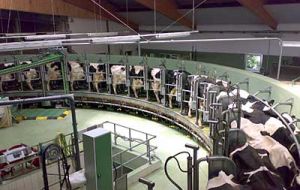MercoPress. South Atlantic News Agency
US report shows more E.coli in urban waterways runoff areas than from animal production facilities
 Feed lots and dairy farms in California are not that contaminating after all
Feed lots and dairy farms in California are not that contaminating after all Studies by the United States Agricultural Research Service (ARS) scientist Mark Ibekwe suggest that in some parts of California, pathogens in local waterways are more often carried there via runoff from urban areas, not from animal production facilities
Even though most strains of Escherichia.coli are non-pathogenic, the bacterium is monitored by public health officials as an indicator of water quality. Cows are often seen as the culprits when E. coli is found in local lakes, rivers and other bodies of water.
Ibekwe, who works at the ARS US Salinity Laboratory in Riverside, California and his colleagues, collected 450 water and sediment samples from 20 sites throughout California's middle Santa Ana River Watershed.
The collection sites included urban areas, livestock feeding areas, parks, National Forest lands, and three wastewater treatment plants.
Then the scientists extracted E. coli bacteria from each sample and identified 600 different isolates of E. coli in their samples, many of which could be placed into six clonal populations.
They found the greatest variety of different types of E. coli in runoff discharged from areas dominated by urban development or human activities. Ibekwe also tested all the E. coli isolates for resistance to various antibiotics. He found that from 88 to 95% of the isolates were resistant to rifampicin, and that around 75% were resistant to tetracycline.
Tetracycline resistance was by far the most common type of resistance observed in E. coli isolates collected near wastewater treatment plants. The scientists also found that 24% of E. coli collected in sediment samples associated with urban runoff—a total of 144 isolates—showed resistance to as many as seven antibiotics. Results from this work were published in PLOS ONE. (Source: Argentine Beef Packers S.A.).




Top Comments
Disclaimer & comment rulesCommenting for this story is now closed.
If you have a Facebook account, become a fan and comment on our Facebook Page!